18 Mar 2015 | Bahrain, Campaigns
After several unsuccessful appeals to prison administration officials for adequate medical assistance, leading Bahraini human rights defender Abdulhadi Al-Khawaja has publically announced that he has gone on hunger strike in protest of his continued arbitrary detention and mistreatment while in prison.
Al-Khawaja, who began the water-only hunger strike on 2 March 2015, is suffering from serious health issues and is at severe risk of further health complications.
“He sounded weak and exhausted on the phone to an extent that we could tell how sick he was, but this won’t stop him from battling for his freedom and the freedom of all human rights defenders in Bahrain,” said his daughter Maryam Al-Khawaja, Co-Director of at the Gulf Center for Human Rights (GCHR).
Abdulhadi Al-Khawaja, the Co-founder of the Gulf Center for Human Rights (GCHR) and the Bahrain Center for Human Rights (BCHR), was sentenced to life in prison in June 2011 for peaceful human rights activities The undersigned organizations and individuals express their grave concern about the continued mistreatment of Al-Khawaja while in detention and call on the Government of Bahrain to immediately and unconditionally address Al-Khawaja’s legitimate demands.
On 23 February 2015, Al-Khawaja delivered a letter to the head of Jaw prison informing the authorities that he would be starting a hunger strike on 2 March 2015 including the demands listed below.
Specific demands related to the hunger strike:
1. Hand over a copy of his medical file to his family or his lawyer to get a second opinion on a much-needed operation. This request was previously made on 2 January 2015.
2. Allow visitation rights to his son-in-law via the procedure of making special requests, according to standard procedures.
3. Allow flexibility in the number of people permitted during family visits as it used to be 10 but had been reduced to six.
4. Make available the prison law list to make clear what rights and obligations prisoners have.
5. Allow families to bring magazines to prisoners, which used to be allowed but have been stopped since three weeks ago.
6. Make available Al-Wasat and Al-Watan newspapers with the rest of newspapers available.
7. Allow families to bring a radio or make it available at the prison store as per the decision that was made five months ago but not implemented after the banning of MP3 players.
8. Set up a mechanism for follow up in regards to the other issues related to Building 7 at Jaw prison.
General demands:
1. Protest about continued arbitrary arrests and lack of investigation into torture.
2. Protest against the generally bad situation in the prison, especially in the recent period.
Background information:
On 4 September 2012, the United Nations Working Group on Arbitrary Detention issued a decision on Al-Khawaja’s case, defining it as “arbitrary” and calling for his immediate release. This is at least the fourth time Al-Khawaja has gone on a water-only hunger strike, putting him at serious risk of cardiac arrest or slipping into a coma. During the last phone call he made to his family on 14 March, Al-Khawaja’s blood sugar was 2.5, his blood pressure was 90/60, his weight had gone down 10 kilos to 53, ketone level was 2+, and he sounded exhausted and weak on the phone. He also informed his family that the doctors conveyed a threat from officers that if his health further deteriorates, he will be forcibly moved and force fed, an action that is considered torture by the United Nations experts.
According to a local internal medicine specialist, “When fat stocks are used up after prolonged or recurrent periods of hunger strikes, a catastrophic protein catabolism will develop. Main somatic complications ensuing from these physiopathological mechanisms are dehydration, shock, renal failure, stroke, hypoglycemic coma, metabolic disturbances (arrhythmias), vitamin deficiencies (Gayet-Wernicke), peptic ulcers and nephrolithiasis, without forgetting the major risks associated with re-nutrition.”
She warned, “Serious complications and death occur especially from the fortieth day on, but early and unexpected complications are possible. Close medical monitoring is recommended after 10% of weight loss in lean healthy individuals. Serious medical problems begin at a loss of approximately 18% from initial body weight. The risk of neurological signs by thiamine (vitamin B1) deficiency is common in cases of fasting with exclusive intake of sugar and liquids.” Those who go on hunger strike are prone to have multiple deficiencies including iron deficiency, Vitamin b12 and Folate deficiency which will make them at greater risk of developing anemia.
Al-Khawaja’s family members noticed that he was very pale, which could be secondary to chronic anemia due to his recurrent hunger strikes with underlying malnutrition conditions. Chronic anemia especially in cases of hunger strike with Folate or B12 and other mineral deficiencies will make persons undergoing hunger strikes prone to have cardiac failure with high risk of arrhythmia.
We the undersigned organisations and individuals call on the Government of Bahrain to immediately and unconditionally release Abdulhadi Al-Khawaja, who has been imprisoned solely for practicing his right to free expression and as a result of his human rights work. We also call on the authorities in Bahrain to respond to Al-Khawaja’s demands, and to guarantee better prison conditions for all prisoners in Bahrain.
Signed:
Avocats Sans Frontier (ASF)
Amman Center for Human Rights Studies
Americans for Democracy and Human Rights in Bahrain (ADHRB)
Arabic Network for Human Rights Information (ANHRI)
Bahrain Center for Human Rights (BCHR)
Bahrain Institute for Rights and Democracy (BIRD)
Bahrain Rehabilitation and Anti-Violence Organization (BRAVO)
Bahrain Salam for Human Rights
Bahrain Youth Society for Human Rights (BYSHR)
Canadian Journalists for Free Expression (CJFE)
CIVICUS : World Alliance for Citizen Participation
Damien McCormack – Irish Surgeon and activist
European Bahraini Organization for Human Rights (EBOHR)
Freedom House
Gulf Center for Human Rights (GCHR)
Index on Censorship
International Federation for Human Rights (FIDH)
International Service for Human Rights
Khiam Center for Rehabilitation
Lawyer’s Rights Watch Canada
Lord Eric Avebury – Vice-Chair, Parliamentary Human Rights Group UK
MENA Monitoring Group
No Peace Without Justice
PEN International
Sentinel Defenders
The International Center for Supporting Rights and Freedoms
Yemen Organization for Defending Rights and Democratic Freedoms
Participate in our campaign #FreeAlkhawaja
Take an active role in our solidarity campaign by supporting Al-Khawaja in his hunger strike battle, by signing the petition to free Al-Khawaja on the following link:
https://www.change.org/p/the-government-of-bahrain-freealkhawaja-immediately-and-unconditionally-2?just_created=true
And post your photo with the hash-tag #FreeAlkhawaja on:
Facebook:http://www.facebook.com/pages/Gulf-Center-For-Human-Rights/273623332709903
Twitter: @GulfCentre4HR
Google+: https://plus.google.com/u/1/112405182651959689611/posts
3 Mar 2015 | About Index, Campaigns, Press Releases, Statements
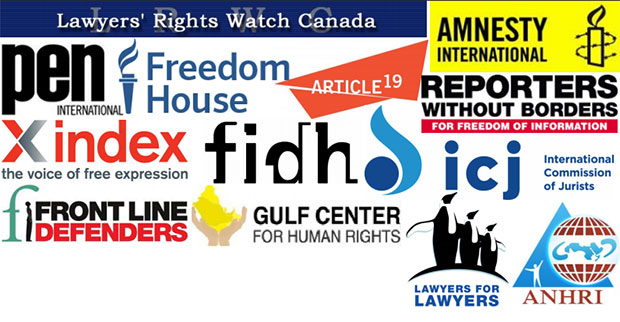
On the second anniversary of the start of the mass “UAE 94” trial that imprisoned dozens of government critics and reform activists in the United Arab Emirates (UAE), including prominent human rights defenders, judges, academics, and student leaders, a coalition of 13 organizations calls on the UAE government to release immediately and unconditionally all those imprisoned solely for peacefully exercising their rights to freedom of expression and association following this grossly unfair trial, as well as those who remain detained or imprisoned for publicizing concerns about it. The organizations also call on the authorities to ensure that the allegations of torture and other ill-treatment that the individuals were subjected to prior to and following their trial are promptly, independently, impartially and thoroughly investigated, that those responsible are held to account, and that the victims have access to effective remedies and to reparation.
The organizations share the serious concerns raised since 2011 by several UN human rights bodies and human rights organizations regarding the UAE government’s continuing pattern of harassment, secret, arbitrary and prolonged incommunicado detention, torture and other ill-treatment, enforced disappearances, and unfair trials targeting activists and those critical of the authorities, as well as its increasing use of national security as a pretext to clamp down on peaceful activism and to stifle calls for reform.
The space for dissent in the UAE is increasingly shrinking. The repression has been entrenched with the enactment in 2012 of the cybercrimes law, which the government has used to silence social media activists and others who support and defend freedom of expression online, and the enactment of the 2014 counter-terror law. The vague and overly broad definition of terrorism in the 2014 law, which treats a wide range of activities, including those protected by human rights standards, as amounting to terrorism, may be used to sentence human rights defenders or critics of the government to lengthy prison terms or even death.[1]
The organizations call on the UAE government, which currently is a member of the UN Human Rights Council, to adhere to its obligations to uphold human rights at home, including respecting the rights to freedom of opinion and expression, and to freedom of association and peaceful assembly.
The anniversary of the mass trial, widely known as the “UAE 94” trial, coincides with the anniversary of the March 2011 petition from a group of 133 high-profile women and men addressed to the UAE President, which called for democratic reform. The petition elicited an uncompromisingly repressive response from the UAE authorities and many of its signatories, and their families, have been harassed, arbitrarily arrested, or imprisoned in the four years since they put their names to their call for reform.
The UAE 94 trial, which began on 4 March 2013 before the State Security Chamber of the Federal Supreme Court in Abu Dhabi, saw a total of 94 defendants, including eight who were charged and tried in absentia, stand trial en masse on the charge of establishing an organization that aimed to overthrow the government, a charge which they all denied. The trial failed to meet international fair trial standards and was widely condemned by human rights organizations and UN bodies, including the UN Working Group on Arbitrary Detention. The court accepted prosecution evidence that consisted largely of “confessions” made by defendants while they were in pre-trial detention. The court failed to require, before the admission of such evidence, that the prosecution prove beyond reasonable doubt that the “confessions” were obtained by lawful means and voluntarily from the accused. The court also failed to take steps to investigate, or order a prompt, independent, impartial and thorough investigation of the defendants’ claims that State Security interrogators had forced them, under torture or other ill-treatment, to make false “confessions” incriminating themselves and others during months when they were held incommunicado in secret locations and without access to lawyers or the outside world. The defendants were also denied a right of appeal to a higher tribunal; under UAE law, Federal Supreme Court judgments are final and not subject to appeal.[2]
On 2 July 2013, the court convicted 69 of the 94 defendants, including the eight tried in absentia, and acquitted 25. The defendants included many people who had achieved prominence in the UAE in their respective fields in the law, education and academia, business, and as government advisers. The court sentenced to prison terms of between seven and 15 years many well-known figures including: prominent human rights lawyer and law professor Dr Mohammed Al-Roken, who has written a number of books and journal articles on human rights, freedom of expression, and counterterror laws; high profile lawyers Dr Mohammed Al-Mansoori and Salem Al-Shehhi; judge Mohammed Saeed Al-Abdouli; law professor and former judge Dr Ahmed Al-Zaabi; lawyer and university professor Dr Hadef Al-Owais; senior member of the Ras Al-Khaimah ruling family Sheikh Dr Sultan Kayed Mohammed Al-Qassimi; businessman Khalid Al-Shaiba Al-Nuaimi; Science teacher Hussain Ali Al-Najjar Al-Hammadi; blogger and former teacher Saleh Mohammed Al-Dhufairi; student leader Abdulla Al-Hajri; and student and blogger Khalifa Al-Nuaimi who, before his arrest, had kept an active blog which he used to express criticism of the human rights situation in the UAE and the heavy-handed approach of the State Security apparatus.[3]
Others convicted at the trial include seven activists, known as the “UAE 7”, who had their citizenship arbitrarily withdrawn in 2011 and were told to leave the country. They are economist Ahmed Ghaith Al-Suwaidi; teacher Hussein Al-Jabri; former long-term employee of the Ministry of Presidential Affairs Hassan Al-Jabri; teacher Ibrahim Hassan Al-Marzouqi; former teacher Sheikh Mohammed Al-Sadeeq; Dr Shahin Abdullah Al-Hosni; and Dr Ali Hussain Al-Hammadi.
During the trial, the authorities took steps to prevent independent reporting of the proceedings. International media and independent trial observers were not permitted access to the court. Security authorities refused to allow an independent trial observer delegated by Amnesty International entry to the UAE immediately prior to the opening of the trial. Two independent observers sent by the International Commission of Jurists were turned away by plain-clothed security officials before they reached the Federal Supreme Court building.[4] Another international observer mandated by the International Federation for Human Rights, the Gulf Center for Human Rights, the Cairo Institute for Human Rights Studies, and the Arabic Network for Human Rights Information, was also denied access to the final trial hearing on 2 July 2013, despite an earlier indication by the UAE authorities that she would be allowed to attend.[5]
In November 2013, the UN Working Group on Arbitrary Detention issued an Opinion on the UAE 94 case, concluding that the UAE government had deprived the defendants of their right to a fair trial, enshrined in Article 10 of the Universal Declaration of Human Rights (UDHR). The Working Group on Arbitrary Detention found that the arrest and detention of the individuals had resulted from the exercise of their rights to freedom of opinion and expression and to freedom of peaceful assembly and association, guaranteed under articles 19 and 20 of the UDHR, stating that the restrictions on those rights could not be considered to be proportionate and justified. It declared the arrest and detention of the 61 defendants who were imprisoned following the mass trial to be arbitrary and called on the UAE authorities to release them and afford them appropriate reparation.[6]
Authorities also barred some of the defendants’ relatives from the courtroom; and others, who were permitted to attend, were harassed, detained or imprisoned after they criticized the proceedings and publicized torture allegations made by the defendants on the Twitter social media website.
In April 2013, a court sentenced Abdullah Al-Hadidi, the son of one of the UAE 94 who was convicted, Abdulrahman Al-Hadidi, to 10 months’ imprisonment on the charge of publishing details of the trial proceedings “without probity and in bad faith,” after he criticized the proceedings on Twitter. He was released in November 2013.
Blogger and netizen, Obaid Yousef Al-Zaabi, brother of Dr Ahmed Al-Zaabi, was arrested in July 2013 and again in December 2013, and was prosecuted on several charges based on his Twitter posts about the trial, including spreading “slander concerning the rulers of the UAE using phrases that lower their status, and accusing them of oppression” and “disseminating ideas and news meant to mock and damage the reputation of a governmental institution.” In June 2014, Obaid Yousef Al-Zaabi was acquitted of all charges but, despite this, the authorities continue to arbitrarily detain him, even though there is no legal basis for depriving him of his liberty. He remains in the prisoners’ ward of Sheikh Khalifa Medical City Hospital in Abu Dhabi, as he continues to suffer from advanced arthritis and rheumatism and has difficulty walking.[7]
Osama Al-Najjar, netizen and son of Hussain Ali Al-Najjar Al-Hammadi, was arrested in March 2014 and prosecuted for charges based on messages he posted on Twitter defending his father, who is one of the UAE 94. In November 2014, he was sentenced to three years’ imprisonment and a heavy fine for charges including “designing and running a website on social networks with the aim of publishing inaccurate, satirical and defaming ideas and information that are harmful to the structure of State institutions”; “offending the State”; “instigating hatred against the State”; and “contacting foreign organizations and presenting inaccurate information” about the UAE 94 trial and living conditions inside Al-Razeen Prison. He had no right to appeal the verdict and is imprisoned in Al-Wathba Prison, Abu Dhabi.[8]
The UAE 94 trial proved to be the centerpiece of the authorities’ broader crackdown targeting expression of dissent and advocacy of greater public participation in the governance of the UAE and other reform. At one stroke, the authorities removed from the public arena their most prominent critics and the country’s leading advocates of reform, while signaling to other potential dissenters that they will not tolerate open political debate in the UAE or any form of criticism of the government.[9]
The coalition is very concerned about the lack of space for rights organizations to do their legitimate work and about the repeated attempts by the UAE authorities or their supporters to eliminate freedom of expression for its residents, not only in the traditional media, but also on social media networks. On 28 October 2014, for example, high profile human rights defender and blogger Ahmed Mansoor’s Twitter account, in which he publishes his personal thoughts and views, was hacked. On 15 February 2015, three sisters, Asma Khalifa Al-Suwaidi, Maryam Khalifa Al-Suwaidi and Alyaziyah Khalifa Al-Suwaidi, were subject to enforced disappearance and there are serious concerns for their safety. The three sisters have campaigned peacefully online for the release of their brother, one of the UAE 94 prisoners, Dr Issa Al-Suwaidi, highlighting his unfair trial and the human rights violations to which he was subjected at the hands of UAE authorities. Dr Issa Al-Suwaidi is a respected academic and was the General Secretary of the Red Crescent in the UAE between 1996 and 1998.
On 16 February 2015, government-owned newspaper The National reported that the UAE government had adopted 36 recommendations made by the Human Rights Department of the UAE’s Ministry of Foreign Affairs after it carried out a study of international reports on the country’s human rights performance. The online newspaper said one of the recommendations was that an independent committee be established to review all allegations of torture, which the coalition endorses. However, the report disappeared from The National’s website the day after it was published, which is discouraging.[10]
The coalition urgently calls on the UAE authorities to implement recommendations by UN bodies and international human rights organizations to:
- release immediately and unconditionally all those individuals detained or imprisoned solely for peacefully exercising their rights to freedom of expression and association;
- prohibit the practice of secret detention;
- institute safeguards against torture and other ill-treatment, and ensure that all complaints or allegations of torture and other ill-treatment are promptly, independently and thoroughly investigated;
- ensure that victims of torture and other ill-treatment, arbitrary detention, and other human rights violations have access to effective remedies;
- ensure that all persons deprived of their liberty receive a fair and public hearing by an independent and impartial court in accordance with international human rights standards, including by having the right to appeal the judgment before a higher court or tribunal;
- publish the 36 recommendations made by the Human Rights Department of the UAE’s Ministry of Foreign Affairs, and implement the recommendation that an independent committee be established to review all allegations of torture;
- amend any legislation which impermissibly restricts the rights to freedom of expression, association and assembly, with a view to bringing all of these laws into full conformity with the UAE’s obligations under international human rights law, including the Universal Declaration of Human Rights; and
- ratify the International Covenant on Civil and Political Rights and its Optional Protocols, and the International Convention for the Protection of all Persons from Enforced Disappearance.
***********************************
Amnesty International
For more information please call Amnesty International’s Middle East and North Africa press officer Sara Hashah on +44 20 7413 5566 / +44 7778 472 126, or email: [email protected]
Arabic Network for Human Rights Information (ANHRI)
For more information, please email Rawda Ahmed, Deputy Executive Director and Head of Legal Aid Unit, on [email protected]
ARTICLE 19
For more information, please contact David Diaz-Jogeix, Director of Programmes, on [email protected]
Gulf Centre for Human Rights
For more information, please call Khalid Ibrahim on +961 70159552, or email: [email protected] www.gc4hr.org
Freedom House
For media inquiries, please email Robert Herman, Vice President for Regional Programs, on [email protected]
Front Line Defenders
For more information, please call Jim Loughran, Head of Media and Communications on +353 (0)1 212 3750, or email [email protected]
Index on Censorship
For more information, please contact Melody Patry, senior advocacy officer, on +44 207 260 2660 or [email protected]
International Commission of Jurists
For more information, please contact Said Benarbia, Middle East and North Africa Programme, on + 41 22 979 38 17 or [email protected]
International Federation for Human Rights (FIDH)
For more information, please contact Arthur Manet, Director of media relations, on +33 1 43 55 90 19 or [email protected]
Lawyers for Lawyers
For more information, please call Ms Adrie van de Streek, Executive Director on +31 (0)6 26 274 390 or email [email protected]
Lawyers’ Rights Watch Canada
For more information, please call Gail Davidson, Executive Director, on +1 (604) 736 1175, or email [email protected]
PEN International
For more information, please contact PEN’s Communications and Campaigns Manager Sahar Halaimzai on +44 (0) 20 7405 0338 or email [email protected]
Reporters Without Borders
For more information, please call Lucie Morillon, Programme Director on +33 1 44 83 84 71, or email [email protected]
[1] Gulf Centre for Human Rights, Front Line Defenders, Cairo Institute for Human Rights Studies, Arabic Network for Human Rights Information, UAE: Fear that Anti-Terrorism Law will be used to curtail human rights and target human rights defenders, 13 December 2014, http://www.gc4hr.org/news/view/850
[2] International Commission of Jurists, Mass Convictions Following an Unfair Trial: The UAE 94 Case, 4 October 2013, http://icj.wpengine.netdna-cdn.com/wp-content/uploads/2013/10/UAE-report-4-Oct-2013smallpdf.com_.pdf
[3] A few days before his own arrest in July 2012, Khalifa al-Nuaimi wrote on his blog about the wave of mass arrests by the UAE’s State Security apparatus, saying “You do not have the right to take a son from his father…a father from his son…a teacher from his students…a preacher from his audience…and imprison them unlawfully.”
[4] International Commission of Jurists, United Arab Emirates: ICJ condemns blatant disregard of the right to a fair and public trial, 12 March 2013, http://www.icj.org/united-arab-emirates-icj-condemns-blatant-disregard-of-the-right-to-a-fair-and-public-trial/?_sm_au_=iVV7R4317ftBnjDP
[5] Doughty Street Chambers, UAE denies International Legal Observer access to verdict in show trial of UAE 94, 1 July 2013, http://www.doughtystreet.co.uk/news/article/uae-denies-international-legal-observer-access-to-verdict-in-show-trial-of-; The coalition released two judicial observation reports based on interviews conducted by British human rights lawyer Melanie Gingell with family members who attended the hearings, local human rights defenders and activists, as well as international and local media: International Federation for Human Rights, Gulf Center for Human Rights, Cairo Institute for Human Rights Studies, the Arabic Network for Human Rights Information, United Arab Emirates: Criminalising Political Dissent, 27 August 2013, https://www.fidh.org/International-Federation-for-Human-Rights/north-africa-middle-east/united-arab-emirates/united-arab-emirates-criminalising-political-dissent-13879; Alkarama, Amnesty International, Arabic Network for Human Rights Information, Gulf Centre for Human Rights, Human Rights Watch, International Federation for Human Rights, UAE: Unfair Trial, Unjust Sentences, 3 July 2013, https://www.fidh.org/International-Federation-for-Human-Rights/north-africa-middle-east/united-arab-emirates/uae-unfair-trial-unjust-sentences-13590
[6] United Nations General Assembly, Human Rights Council, Working Group on Arbitrary Detention, Opinions adopted by the Working Group on Arbitrary detention at its 68th Session (13-22 November 2013), UN Doc A/HRC/WGAD/2013/60.
[7] Amnesty International understands that during the first few weeks after his arrest, a senior State Security Prosecution official told Obaid Yousef Al-Zaabi that he would not be released even if he went to trial and a court found him innocent.
[8] Reporters Without Borders, Online activist gets three years for criticizing torture of detainees, 2 December 2014, http://en.rsf.org/emirats-arabes-unis-online-activist-gets-three-years-02-12-2014,47327.html;
[9] Amnesty International, There is no freedom here – Silencing dissent in the United Arab Emirates (MDE 25/018/2014), 18 November 2014 https://www.amnesty.org/en/documents/MDE25/0018/2014/en/
[10] The National, “Government approval for 36 human rights ‘recommendations’, FNC hears”, 16 February 2015, http://www.thenational.ae/uae/government-approval-for-36-human-rights-recommendations-fnc-hears
11 Feb 2015 | Azerbaijan, Azerbaijan Statements, mobile, News, Statements
In January, Index on Censorship reported on the beginning of the trial of human rights activist Rasul Jafarov, who is being tried on spurious charges. The Azerbaijani embassy has written to Index on Censorship responding to that article. This is the Index response to the embassy.
Dear Ambassador Tahir Taghizadeh,
Thank you for your letter in response to our report on the beginning of the trial of human rights and democracy activist Rasul Jafarov.
In your letter, you wrote:
“In my country, human rights and fundamental freedoms are ensured in full compliance with the national and international commitments that Azerbaijan has subscribed to. No one is persecuted for his/her political views and activities as proved by Azerbaijan’s vibrant political process and free and diverse media.”
We beg to differ with your point of view.
Azerbaijan’s record on human rights and a free press has been discussed with great concern at the international level many times in recent years.
In March 2012, Index on Censorship joined with Article 19, Human Rights House Foundation, International Federation of Journalists, Media Diversity Institute, Norwegian Helsinki Committee, Reporters Without Borders and World Association of Newspapers and News Publishers to co-produce Running Scared: Azerbaijan’s Silenced Voices. The report opened with this stark warning: “The current state of freedom of expression in Azerbaijan is alarming, as the cycle of violence against journalists and impunity for their attackers continues; journalists, bloggers, human rights defenders and political and civic activists face increasing pressure, harassment and interference from the authorities; and many who express opinions critical of the authorities – whether through traditional media, online, or by taking to the streets in protest – find themselves imprisoned or otherwise targeted in retaliation.”
In December 2012, the Parliamentary Assembly of the Council of Europe issued a monitoring report that included the comments that the “situation with regard to basic freedoms, including freedom of expression, freedom of assembly and freedom of association is preoccupying. The committee expresses its alarm at reports by human rights defenders and domestic and international NGOs about the alleged use of so-called fabricated charges against activists and journalists. The combination of the restrictive implementation of freedoms with unfair trials and the undue influence of the executive results in the systemic detention of people who may be considered prisoners of conscience. Alleged cases of torture and other forms of ill-treatment at police stations, as well as the impunity of perpetrators, raise major concern”.
In April 2013, the Human Rights Council of the United Nations work group issued its report from Azerbaijan’s universal periodic review. Among the recommendations were suggestions for improvements on human rights and more specifically freedom of expression:
• Ensure the full enjoyment of the right to freedom of expression in line with country’s international commitments (Slovakia)
• Guarantee the rights to freedom of expression, association and peaceful assembly particularly by allowing peaceful demonstrations in line with the obligations stemming from the International Covenant on Civil and Political Rights (Switzerland);
• Put in place additional and fitting measures to ensure respect for freedom of expression and of the media (Cyprus);
• Ensure that Azerbaijani media regulations uphold diversity among media outlets, as per international standards and best practices (Cyprus);
• Expand media freedoms across print, online and, in particular, broadcast platforms, notably by ending its ban on foreign broadcasts on FM radio frequencies and eliminating new restrictions on the broadcast of foreign language television programs (Canada);
• Take effective measures to ensure the full realization of the right to freedom of expression, including on the Internet, of assembly and of association as well as to ensure that all human rights defenders, lawyers and other civil society actors are able to carry out their legitimate activities without fear or threat of reprisal (Czech Republic);
• Ensure that human rights defenders, lawyers and other civil society actors are able to carry out their legitimate activities without fear or threat of reprisal, obstruction or legal and administrative harassment (Sweden);
• Put an end to direct and indirect restrictions on freedom of expression and take effective measures to ensure the full realization of the right to freedom of expression and of assembly (Poland);
• Ensure the full exercise of freedom of expression for independent journalists and media, inter alia, by taking into due consideration the recommendations of the Council of Europe Commissioner for Human Rights (Italy);
• Ensure that journalists and media workers are able to work freely and without governmental intimidation (Germany);
• Ensure that journalists and writers may work freely and without fear of retribution for expressing critical opinions or covering topics that the Government may find sensitive (Slovenia);
• Protect and guarantee freedoms of expression and association in order to enable human rights defenders, NGOs and other civil society actors to be able to conduct their activities without fear of being endangered or harassed (France);
• Strengthen measures to guarantee a safe and conducive environment for the free expression of civil society (Chile);
• Remove all legislative and practical obstacles for the registration, funding and work of NGOs in Azerbaijan (Norway);
• Ensure that all human rights violations against human rights defenders and journalists are investigated effectively and transparently, with perpetrators being promptly brought to justice, including pending unresolved cases requiring urgent attention (United Kingdom);
• Ensure prompt, transparent and impartial investigation and prosecution of all alleged attacks against independent journalists, ensuring that
the media workers do not face reprisals for their publications (Slovakia);
Though Azerbaijan has the modern legal framework in place to respond to these suggestions from the international community, the respect for the rule of law is sorely lacking.
In October 2013, Index on Censorship published Locking up free expression: Azerbaijan silences critical voices, which described the situation in your country in the run up to the presidential elections.
We wish that was the end of the story, that our insistence that Azerbaijan respect free of expression was based on outdated information or thoroughly implemented international recommendations.
But in 2014 the assault against journalists and human rights activists accelerated with detentions of well-respected individuals with international profiles and the temerity to speak some uncomfortable truths to the government of Azerbaijan.
These are just a few of the cases against journalists and human rights activists that we follow:

Anar Mammadli and Bashir Suleymanli
Anar Mammadli and Bashir Suleymanli — sentenced to 5.5 and 3.5 years respectively in May 2014 — are prominent human rights activists and founders of the Election Monitoring and Democracy Studies Centre. They were arrested and jailed in 2013, following outspoken criticism of presidential elections in October 2013, despite international protests. Those are the same polls that invited election observers from the OSCE found lacking. On 29 September 2014, Mammadli was awarded the Václav Havel Award for Human Rights by the Council of Europe.
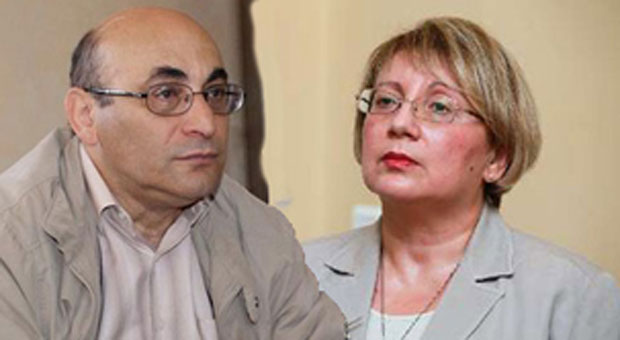
Arif and Leyla Yunus (Photo: HRHN)
Leyla Yunus — arrested 30 July 2014 — is the director of the Peace and Democracy Institute, which among other things works to establish rule of law in Azerbaijan. She has been charged with state treason (article 274 of the Criminal Code of the Republic of Azerbaijan), large-scale fraud (article 178.3.2), forgery (article 320), tax evasion (article 213), and illegal business (article 192). On 18 February, her pre-trial detention was extended for another five months. Her husband Arif Yunus was arrested 5 August 2014. Arif Yunus is facing charges of state treason and fraud. Both have had their initial three month pre-trial detentions extended.
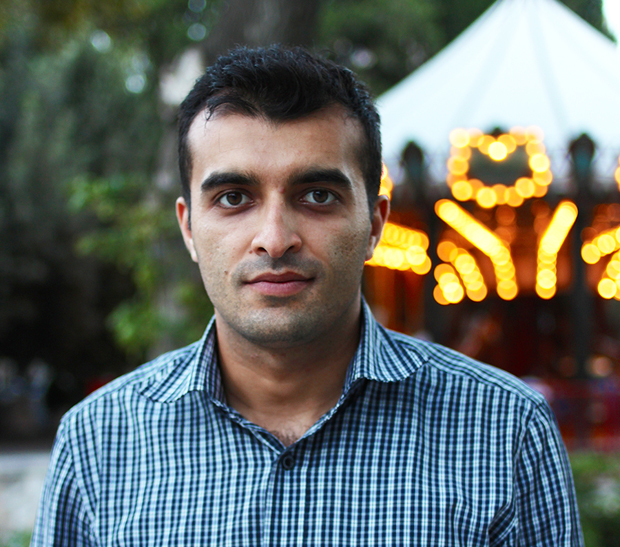
Human rights and democracy activist Rasul Jafarov (Photo: Melody Patry)
Rasul Jafarov — arrested 2 August 2014 — one of the initiators and coordinators of the campaign “Sing for Democracy” and “The Art of Democracy”, advocated for the rights of political prisoners, actively participated in the International Platform “Civil Solidarity.” He is accused of: tax evasion (Article 192), illegal business (Article 213) and malpractice (Article 308). The charges carry a possible sentence of 12 years.
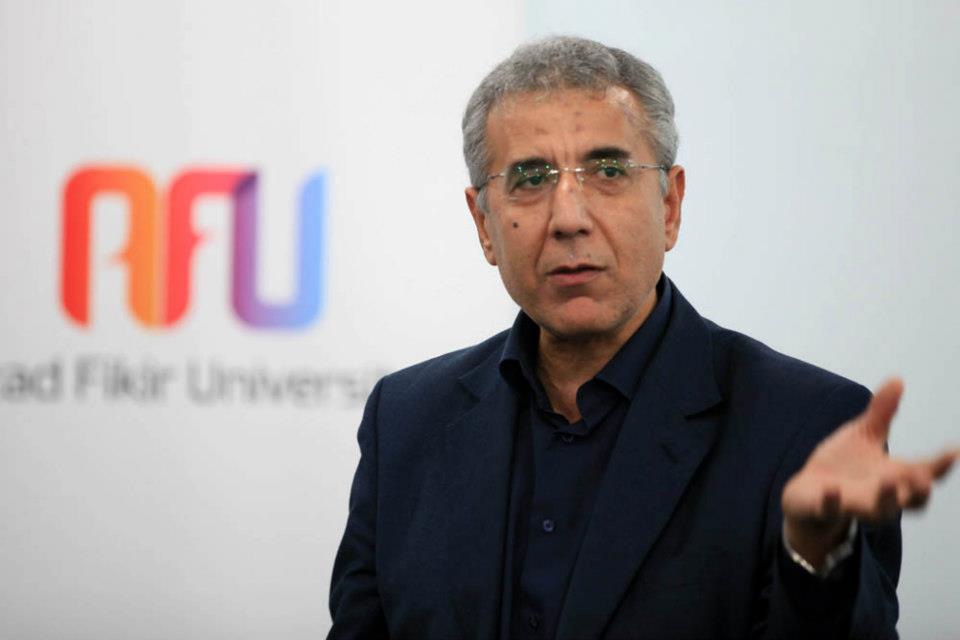
Lawyer Intigam Aliyev
Intigam Aliyev — arrested 8 August 2014 — is a human rights defender and a lawyer specialized in defending rights of citizens in the European Court of Human Rights. He is charged with Articles 213.1 (tax evasion), 308.2 (malpractice) и 192.2 (illegal business) of the Criminal Code. Index was heartened to hear that Aliyev was at least allowed to sit with his lawyers in court on Feb 3.
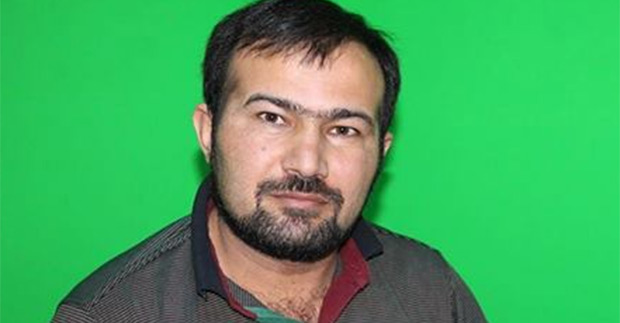
Journalist Seymur Hezi
Seymur Hezi — arrested 29 August 2014 — works for independent newspaper Azadliq and host of the news programme “Azerbaijan Hour”. He is a member of the opposition Popular Front Party. Index reported on January 29 that Hezi was sentenced to a five-year prison sentence on charges of “aggravated hooliganism” on 29 January.
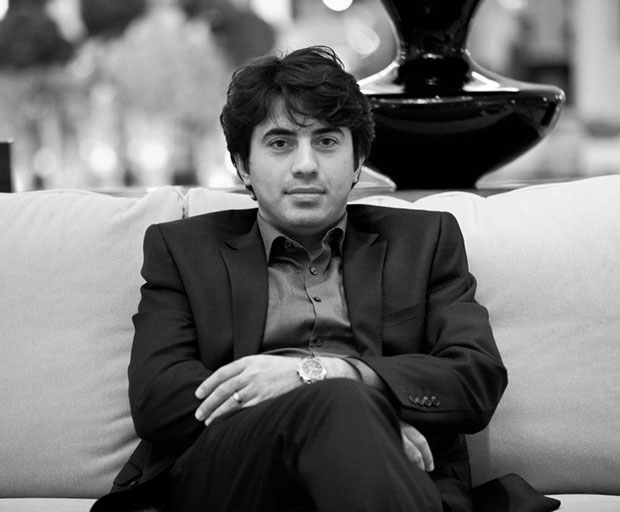
Emin Huseynov, journalist and human rights defender, director of the Azerbaijani Institute for Reporters’ Freedom and Safety (IRFS)
Emin Huseynov — went into hiding in August 2014 — is an internationally recognised human rights defender and leader of the Institute for Reporters’ Freedom and Safety (IRFS). IRFS is the leading media rights organisation in Azerbaijan and one of the main partner organisations of the Human Rights House Network in the country. Huseynov was charged with tax evasion, illegal business and abuse of authority after he went into hiding at the Swiss embassy. Florian Irminger, head of advocacy at the Human Rights House Foundation (HRHF), of which Index is a network member, called on Switzerland to continue to host Huseynov. “His location at the embassy is justified by the level of the repression in the country, the bogus charges brought against human rights defenders in Azerbaijan and the impossibility for them to defend themselves in court, due to the lack of independence of the judiciary and the harassment of their lawyers.”

Khadija Ismayilova
Khadija Ismayilova — arrested on 5 December — is an investigative journalist and radio host who is currently working for the Azerbaijani service of Radio Free Europe/Radio Liberty. She is a member of the Organized Crime and Corruption Reporting Project. She was arrested under charges of incitement to suicide, a charge widely criticised by human rights organizations. Ismayilova is currently being supported by two petition campaigns by Index on Censorship and Reporters Without Borders. On 13 Feb, lawyer Fariz Namazly told Contact.az that new charges have been filed. According to him, Ismayilova is charged under the Article: 179.3.2 (large-scale embezzlement), 192.2.2 (illegal business), 213.1 (tax evasion) and 308.2 (abuse of power.) The charges carry a possible sentence of 12 years.
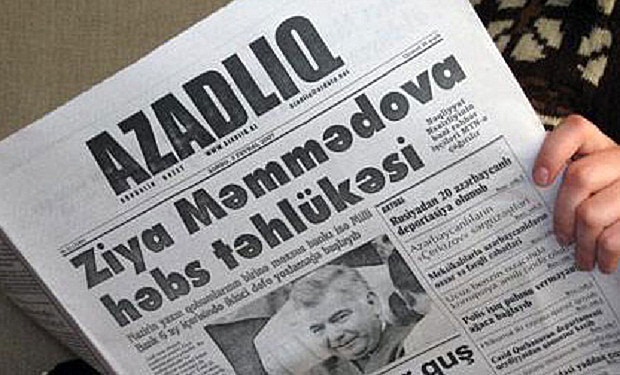
Award-winning newspaper Azadliq was forced to halt its print edition in July 2014 as its bank accounts were frozen. We reported on this in August 2014.
In September, the European Parliament adopted a resolution on the human rights situation in your country.
In November, Nils Muižnieks, the Council of Europe Commissioner for Human Rights, called his autumn 2014 mission to Azerbaijan one of the most difficult of his tenure. He wrote, “In late October I was in Azerbaijan, the oil-rich country in the South Caucasus, which just finished holding the rotating chairmanship of the 47-member Council of Europe. Most countries chairing the organisation, which prides itself as the continent’s guardian of human rights, democracy and the rule of law, use their time at the helm to tout their democratic credentials. Azerbaijan will go down in history as the country that carried out an unprecedented crackdown on human rights defenders during its chairmanship.”
You mention in your letter that individuals are not being arrested for their human rights work but it seems an astonishing coincidence that all these prominent human rights defenders should all be guilty of such an array of financial crimes. And that brings us full circle to the present. Since we received your letter, there have been several developments that we would like to brief you on:
On 29 January 2015, a provisional resolution before the CoE called attention to the cases of investigative journalist Khadija Ismayilova, human rights activist Emin Huseynov and the closure of Radio Free Europe/Radio Liberty. Further on in the resolution PACE was being asked to call on Azerbaijan to properly investigate the murders of journalists Elmar Huseynov (2005) and Rafiq Tagi (2011).
On 3 Feb, President Aliyev signed an amended media law that restricts press freedom by making it easier to shutter media outlets.
Just today, Reporters Without Borders released its World Press Freedom Index 2015, which places Azerbaijan at 162. That’s down 2 spots from last 2014.
We wish Azerbaijan’s commitment to a “free and diverse media” was more than just words and we will continue to report on these detentions – as we do globally – for as long as these words are not translated into action.
Best regards
Jodie Ginsberg
Chief Executive
Index on Censorship
2 Feb 2015 | Egypt, mobile, News
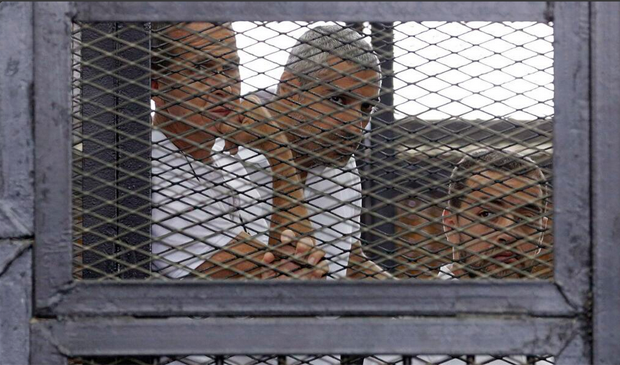
Peter Greste, Mohamed Fadel Fahmy and Baher Mohamed are three Al Jazeera journalists were among those sentenced to prison on terrorism charges.
As journalist Peter Greste returns to Australia to a hero’s welcome home, his two colleagues Canadian-Egyptian journalist Mohamed Fadel Fahmy and Egyptian journalist Baher Mohamed languish in an Egyptian prison.
The three Al Jazeera English journalists have spent more than 400 days in jail for no other crime than doing their work. In June 2014, Cairo court sentenced Greste and Fahmy to seven years in prison while Baher was handed down a ten-year sentence on the charges of “spreading false news and supporting a terrorist group.” Baher was given the harsher sentence for allegedly having in his possession an empty shell case that he had picked up at a protest site.
Analysts said that Greste’s abrupt deportation to his native Australia was the result of immense international pressure and a persistent international campaign for his release. The move followed the issuance of Presidential Decree No. 104 some months earlier, allowing foreign detainees to be deported for retrial in their own countries. The decree issued by President Abdel Fattah El Sisi in November 2014 came in response to widespread criticism of Egypt’s brutal security crackdown on dissent and the stifling of free expression in the country where four years earlier, opposition activists had taken to the streets to demand “Freedom, Bread and Social Justice.”
Former MP Mostafa Bakry had posted a message on his Twitter account on Saturday night (the day before Greste boarded a flight home via Cyprus) stating that the Australian journalist would be released the following day. On Sunday, Bakry followed up his earlier tweet with another message saying that journalist Mohamed Fahmy (Al Jazeera English Cairo Bureau Chief) would also be freed after having his Egyptian nationality revoked. Negad El Borei, Fahmy’s Defence Lawyer meanwhile, told the independent Al Masry El Youm newspaper that while it was necessary by law that Fahmy drop his Egyptian nationality if he wished to be deported to Canada, Fahmy had not decided to do that. A source close to the presidency also denied allegations that the jailed journalist had been granted amnesty, calling the rumour “baseless and unfounded.” Fahmy, has repeatedly denied in court that he has any links with the outlawed Muslim Brotherhood, insisting he was “a patriot” and “would never do anything to harm Egypt’s national security.
Meanwhile, in a letter addressed to President Abdel Fattah El Sisi on Sunday, Fahmy’s mother, Waffa Bassiouny, pleaded for her son’s release on grounds of ill health.
“As a mother and an Egyptian citizen, I appeal to you Mr. President to pardon my son,” she wrote, adding that “Fahmy is innocent and needs urgent medical treatment for Hepatitis C and a shoulder injury.”
Fahmy had suffered from a dislocated shoulder before his arrest and detention in December 2013 but the lack of treatment (despite his repeated pleas to the judge overseeing the case for medical care) has left him with a permanent disability in his right arm. El Sisi had earlier insisted that Egypt’s judiciary was “independent” adding that he could not influence judicial verdicts and would only be able to pardon the detainees once the legal process had been exhausted. On January 1, 2015, the court ordered a retrial for the three journalists but has not yet set a date for the new trial.
While Peter Greste’s deportation has raised hopes for the imminent release of Fahmy (who has dual citizenship), Egyptian producer Baher Mohamed’s sttuation is somewhat more precarious. His case has received far less media attention than his two high-profile colleagues simply because of the fact that he is solely Egyptian, a case that Rights Lawyer El Borei said “underlines the discrimination in Egyptian legislation against local detainees.”
Egyptian media which has aligned itself with the military-backed authorities since the ouster of Islamist President Mohamed Morsi in July 2013, has remained largely silent about the case of the three AJE journalists, (referred to by some media as the “Marriott-cell case”) save for denunciation by some media of Al Jazeera, accusing the Qatari-funded news network of complicity with the outlawed “terror group.” The network has been banned in Egypt since the overthrow of the Islamist President and had its offices ransacked by security forces several times before the imposition of the ban. Before their arrest and detention at the end of December, 2013, the three journalists had worked without valid credentials out of a makeshift studio in the Marriott Hotel in Zamalek.
In a telephone call on Monday (a day after Greste’s release), Jehan Rashed, Baher’s wife who gave birth to their third baby in August last year while her husband was locked up behind bars, decried the country’s discriminatory policies against native Egyptians.
“I know that the two ‘foreign’ journalists will walk free while Baher will be left to bear the brunt of this whole case. He is paying a heavy price for simply being an Egyptian,” she told Index.
She also complained that prominent TV talk show presenter Lamis El Hadidi had the night before referred to Greste and Fahmy by name on her show on the privately-owned satellite channel CBC but had said she was not sure if the third detainee was named Baher.
“This kind of attitude is typical of the discrimination in the country against one of their own,” she said, sounding distraught.
Egyptian journalist Khaled El Balshy meanwhile told Index that members of the Journalists Syndicate had called for an emergency meeting on Tuesday to discuss possible measures to pile pressure on the authorities for the release of 11 journalists currently behind bars in Egypt, including both Baher and Mohamed Fahmy.
“We had previously signed a petition for their release which was presented to the authorities,” El Balshy told Index by telephone. “We feel that it is now time to send the government another reminder,” he added.
El Balshy did not rule out organizing a rally outside the Syndicate in the coming days to press for the release of the journalists whom he said “should be out doing their work instead of being locked up.”
Egypt was listed among the top ten worst jailers of journalists in the world in an annual report published last December by the New York-based Committee for the Protection of Journalists, CPJ. According to the CPJ report, Egypt had “more than doubled the number of journalists behind bars to at least 12 in 2014, including the three AJE journalists.”
While Egyptian citizens and the country’s pro-government media is paying little attention to Baher Mohamed, he is not forgotten by the international community and the foreign media. In reporting Greste’s release on Sunday, several foreign journalists working in Egypt reminded their audience that Greste’s two colleagues “must not be forgotten” and that “the campaign for their release is far from over.”
The plea was echoed by Greste’s family which vowed to continue its campaign until Fahmy and Baher were also released.
At a press conference in Brisbane on Sunday (held before Peter’s arrival home), Peter’s brother Andrew Greste said, “We want to acknowledge that Peter’s colleagues are still in jail.” His father Juris Greste also said that he “felt deeply for those left behind.”
“Peter will not rest until his colleagues are freed,” said Andrew.










